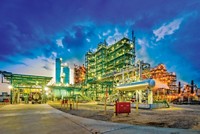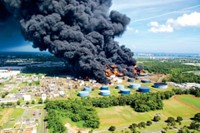Advertisement
Grab your lab coat. Let's get started
Welcome!
Welcome!
Create an account below to get 6 C&EN articles per month, receive newsletters and more - all free.
It seems this is your first time logging in online. Please enter the following information to continue.
As an ACS member you automatically get access to this site. All we need is few more details to create your reading experience.
Not you? Sign in with a different account.
Not you? Sign in with a different account.
ERROR 1
ERROR 1
ERROR 2
ERROR 2
ERROR 2
ERROR 2
ERROR 2
Password and Confirm password must match.
If you have an ACS member number, please enter it here so we can link this account to your membership. (optional)
ERROR 2
ACS values your privacy. By submitting your information, you are gaining access to C&EN and subscribing to our weekly newsletter. We use the information you provide to make your reading experience better, and we will never sell your data to third party members.
Safety
Chemical Safety Board Shuttered
Accidents: No funding, no investigations as CSB furloughs staff, restricts board members
by Jeff Johnson
October 7, 2013
If a chemical plant or refinery blew up today, no federal investigators would be rushing to the site to determine the cause.
Along with most of the rest of the federal government, the Chemical Safety & Hazard Investigation Board is “effectively shut down,” says Daniel Horowitz, CSB managing director. All but three CSB employees have been furloughed—Horowitz, CSB’s general counsel, and an information technology specialist.
“If a large incident were to occur,” Horowitz says, “we would confer with the Office of Management & Budget about the potential recall of investigators from furlough. However, that would be a difficult prospect at best, since the entire administrative side of our house is closed.”
He also notes that “other agencies that assist with CSB travel and accounting are heavily impacted by the shutdown.”
The same constraints appear to affect the National Transportation & Safety Board, which is similar to CSB but investigates transportation-related accidents. For example, NTSB announced on Oct. 6 that it would not investigate a Washington, D.C., subway system accident that killed one worker and injured two more.
The 40-person CSB is charged with investigating the root cause of chemical-related accidents and had some 15 investigations in various stages of completion when government spending was halted.
Stalled examinations include investigations of accidents at Tesoro, Chevron, and four other refineries and preparations for a public hearing on the West Fertilizer explosion in West, Texas. Possible new recommendations on ammonium nitrate safety and preparation for a public meeting on operator fatigue are also on hold.
“All of that is frozen at this point,” Horowitz says. “We were also commencing discussions with other agencies about the presidential executive order on chemical safety and the effort to coordinate prevention and response efforts across the federal sector. The first meeting was scheduled for last week and did not occur due to the shutdown.”
CSB’s three board members, who are appointed by the President and confirmed by the Senate, are not subject to furlough, according to CSB shutdown material provided to OMB. However, they have been told not to engage in activities that would cause CSB to incur additional obligations, and therefore must avoid speeches, public appearances, or other activities that might convey the impression the agency is operating normally.
Meanwhile, a preliminary report of one accident that CSB was examining was issued by Williams Olefins LLC on Oct. 3. The fatal accident occurred June 13, in Williams’s Geismar, La., chemical facility. The internal Williams investigation found that the accident took place when unexpected liquid hydrocarbons remaining in an off-line heat exchanger called a reboiler were heated, rupturing the reboiler and releasing a vapor cloud that ignited and killed two workers.





Join the conversation
Contact the reporter
Submit a Letter to the Editor for publication
Engage with us on Twitter